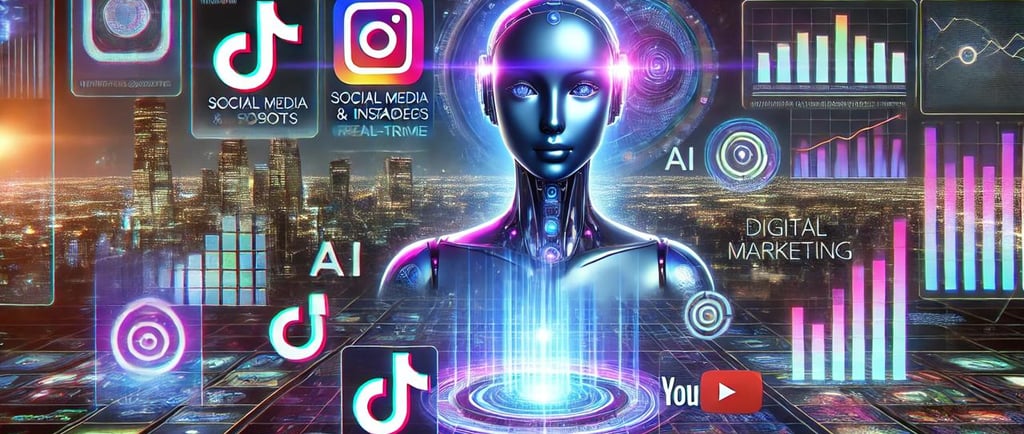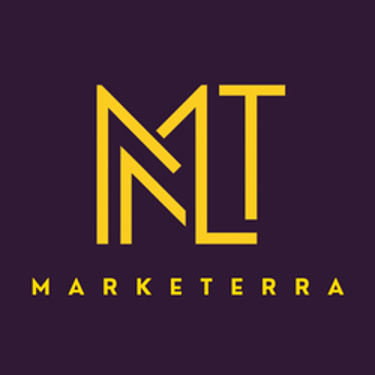The AI Content Revolution: Transforming Social Media and Marketing in 2025
Artificial Intelligence (AI) is no longer a futuristic concept—it’s the driving force behind today’s most innovative marketing strategies. From automating workflows to crafting hyper-personalized campaigns, AI is reshaping how brands create, distribute, and optimize content. In this blog, we’ll explore how AI is revolutionizing content creation, the ethical considerations it raises, and actionable strategies to leverage its power in 2025.
Hessam Mahmoodi
2/10/20252 min read


1. AI-Powered Content Creation: Speed, Scale, and Creativity
AI tools have slashed content production time by 50%, allowing marketers to focus on strategy and audience engagement rather than manual tasks . Generative AI, in particular, has become indispensable:
- Automated Copywriting: Tools like Metricool generate tailored captions, hashtags, and ad copy aligned with brand voice .
- Trend Analysis: AI scans billions of data points to predict viral topics, helping brands stay ahead of trends .
- Multimedia Generation: Platforms like Canva’s AI suite create videos, infographics, and Reels in minutes, optimizing them for platform-specific algorithms .
Example: A fashion brand uses AI to analyze TikTok trends, generate Reels scripts, and produce localized content for global audiences—all within hours .
---
2. Hyper-Personalization: From Generic to Genius
AI’s ability to analyze user behavior and preferences enables unprecedented personalization:
- Dynamic Ads: AI adjusts ad creatives in real-time based on viewer demographics, location, and browsing history. For instance, a travel company might show beach vacations to users in colder climates .
- Chatbots: AI-driven chatbots like Sprinklr’s platform handle 24/7 customer inquiries, recommend products, and even recover abandoned carts .
- Predictive Analytics: Tools like Salesforce Einstein forecast purchasing patterns, allowing brands to target high-intent users with precision .
Stat: Personalized campaigns driven by AI increase conversion rates by 29% compared to generic ads .
---
3. Ethical AI: Balancing Innovation with Responsibility
As AI adoption grows, so do concerns about privacy, bias, and authenticity:
- Data Privacy: Over 80% of consumers worry about how their data is used in AI-driven campaigns . Brands like Apple prioritize transparency, clearly outlining data policies to build trust .
- Bias Mitigation: AI models trained on diverse datasets reduce algorithmic bias. For example, LinkedIn’s AI now flags gendered language in job postings to promote inclusivity .
- Authenticity: While AI generates content, human oversight ensures it aligns with brand values. Patagonia combines AI efficiency with human storytelling to maintain its eco-conscious identity .
---
4. AI + UGC: A Match Made in Marketing Heaven
User-generated content (UGC) remains a cornerstone of authenticity, and AI amplifies its impact:
- Content Curation: AI tools scan social media for UGC featuring branded hashtags, repurposing top-performing posts into ads .
- Sentiment Analysis: Platforms like Sprinklr Insights analyze UGC sentiment, helping brands refine messaging and address customer pain points .
- Monetization: TikTok’s Creativity Program shares ad revenue with creators, incentivizing UGC that drives sales .
Stat: Websites featuring UGC see an 11% boost in average order value compared to those without .
---
5. The Future of AI: AR, VR, and Beyond
Emerging technologies are merging with AI to create immersive experiences:
- AR Try-Ons: L’Oréal’s AI-powered filters let users test makeup virtually, reducing returns by 35% .
- Virtual Stores: IKEA’s AR app, powered by AI, visualizes furniture in customers’ homes, boosting confidence in purchases .
- AI Avatars: Brands like Nike use digital influencers—AI-generated personas—to engage Gen Z on platforms like TikTok .
Prediction: By 2026, 70% of brands will integrate AR/VR into their social commerce strategies .
---
Challenges and Solutions
- Content Overload: AI-generated content risks saturating feeds. Solution: Focus on quality over quantity—use AI to refine high-value posts .
- Platform Dependency: TikTok’s uncertain future highlights the need for diversification. Solution: Build multi-platform strategies, such as Instagram Reels and YouTube Shorts .
- Skill Gaps: Many marketers lack AI expertise. Solution: Invest in training programs and tools with intuitive interfaces, like Canva or Metricool .
---
Conclusion
AI is not replacing marketers—it’s empowering them. By automating repetitive tasks, personalizing at scale, and unlocking new creative frontiers, AI allows brands to focus on what truly matters: building meaningful connections. As Seth Godin said, “Marketing is no longer about the stuff you make but the stories you tell” . In 2025, AI is the ultimate storyteller’s toolkit.
Socials
Follow our socials for updates!
CONTACT
Connect
© 2026. All rights reserved @ MLT Marketerra Marketing Solutions.
